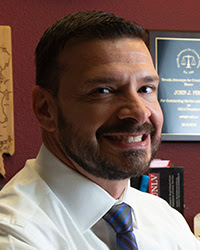John J. Piro, '10

What do you want your legacy to be?
Love is the motive, but justice is the instrument.
---Reinhold Niebuhr
That I stood with the demonized, so that the demonizing will stop.
I stood with the disposable, so that hopefully the day will come when we stop throwing people away.
I stood with those whose burdens were more than they could bear, and I helped to carry the load.
I stood with the poor, the powerless, and the voiceless and I did my best to make those voices heard in a system that reduces people to their worst acts, and tries to permanently label them for life.
That I widened the circle of compassion and let those in who are continually left out by society, and that I caught as many of the stones that people cast at each other as I could.
What was the toughest lesson you’ve learned so far in your career?
I became a public defender because I wanted to help people who were too poor to afford a lawyer, and I didn’t want them to worry about not having a great lawyer to stand beside them and fight for them in court. But as a public defender, I am constantly a witness to some of the greatest injustices our system inflicts on the poor and broken in our city.
We have a system that treats people better if they are rich and guilty than if they are poor and innocent. We have submitted to a system that has the harsh instinct to crush those among us whose brokenness is most visible, and would prefer to hide the broken among us in prisons and jails and walk away, instead of fixing the problems that led us here in the first place—our schools, income inequality, our mental health and health care system.
And that no matter how hard I fight or how righteous the cause, oftentimes, I will still lose.
As an attorney, how do you affect or make changes in the community?
Public defenders are your community lawyers—we represent your mothers, sisters, brothers, fathers, cousins, and family members who cannot afford a lawyer. We are blessed with a degree that gives all of us the flexibility to help people in our community. But, this blessing also comes with a great responsibility to our community. So, I work hard to get proximate to the poor and the vulnerable among us, not just the clients I represent in court, but also the communities affected most by America’s move to mass incarceration.
I have found my advocacy must go beyond the courtroom and out into the community. So, recently I’ve been working with community organizations and advocates to enact changes at the legislative level to ensure that our system of justice starts moving towards treating our fellow citizens in a more humane and fair way.
Getting proximate, and not shielding myself from the problems that affect our poor, vulnerable, and disfavored has allowed me to work on changing the narrative that relies on fear and anger to separate us. Getting proximate has been the best way I have found to help affect change in our community.